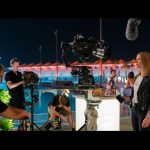Filming a big budget film is a task in itself. Having to shoot in a country, where a revolution breaks out unexpectedly and sweeps through the entire Arab world like a political tsunami brings its own set of challenges and opportunities, Vijaya Cherian learns from Black Gold director Jean-Jacques Annaud. A year ago, when Tarak […]
 Filming a big budget film is a task in itself. Having to shoot in a country, where a revolution breaks out unexpectedly and sweeps through the entire Arab world like a political tsunami brings its own set of challenges and opportunities, Vijaya Cherian learns from Black Gold director Jean-Jacques Annaud.
Filming a big budget film is a task in itself. Having to shoot in a country, where a revolution breaks out unexpectedly and sweeps through the entire Arab world like a political tsunami brings its own set of challenges and opportunities, Vijaya Cherian learns from Black Gold director Jean-Jacques Annaud.
A year ago, when Tarak Ben Ammar, producer and CEO of Quinta Communications spoke about his production Black Gold at The Circle Conference in Abu Dhabi and what it would do for Tunisias film industry, we knew this was a film to look out for. Last month saw the world premiere of Ben Ammars Black Gold on the opening night of the third edition of the Doha Tribeca Film Festival (DTFF). Festival goers said this movie has ushered in a new era of film in the Arab world.
Set in 1930s Arabia, Black Gold traces the story of two warring Emirs who make a truce that binds them to respect a no-mans land between their desert kingdoms. However, after oil is discovered, the stage is set for control of the area and the riches it promises to yield.
BroadcastPro Middle East secured an interview with the films director Jean-Jacques Annaud, for whom Black Gold offered the first opportunity to make a feature film in the Arab world. “This is the first time I have made a featurefilm in the Arab world but its not the first time I have travelled to the Muslim world in general. From Mauritania to Indonesia, Jordan to Comoros, Yemen to Zanzibar, my family and I often chose Arab and Muslim countries as our favorite destinations for holidays. I have had a great interest in this region for the last 20 years and have often felt that this world has been poorly depicted in movies from the West. I decided to see it for myself,” he explains.
Annaud was actually researching another film about the Arab world when he went to see “my old friend Tarak Ben Ammar”. “He gave me this book to read by Hans Ruesch called Black Gold. It had all the great elements of an adventure film that would make you, as the viewer, travel to another world. It had just the right elements of fantasy, almost this 1001 Nights-like atmosphere that was set in the not-too distant past. I found it very universal, with this story of a young prince split between these two fathers. Although it was set in the past, it was a very contemporary story.
I devoured the novel while riding with the Bedouins in the Arabian desert. Was there a better place to be bewitched?” Perhaps one of the biggest dangers of making this film was the unexpected start of the revolution in Tunisia that then triggered the Arab Spring, explains Annaud.
“Such states of crisis are often gripping although this is not the first time I have worked in a troubled country. The Tunisian revolt was directed against one man and his family of looters, not against strangers or the West. My set retained its warm atmosphere.
Technicians, actors and Tunisian extras were buzzing with hope and questions but also, with a fear of the unknown. I found these shared moments of intensity very beautiful and unforgettable. “I was certainly not in the front line, faced with difficulties like my colleagues in the production department. They tore their hair out so that filming could go on despite the chaos, the curfew and the way the public services and transport systems were thrown into disarray,” the director adds.
Every day brought its own set of challenges. Annaud recalls that moment of uncertainty when no one knew how the revolution was going to evolve. Producer Ben Ammar then took the decision to fly everyone back to Europe and chartered seven small aircraft for the purpose, he says. A small bunch of “crazy people”, however, decided to stay, explains Annaud. “I wanted to be like the captain of a sinking ship. A bunch of us decided to stay. Among them was the actress Freida Pinto, who said, Whats the problem? A demonstration? Im from India, Im used to it, whats the big deal? My wife also stayed. We were alone in this huge hotel, three people at the dinner table, 70 people in the kitchen and we couldnt move out. When I went to my room after looking at my dailies and turned off my light, the whole hotel was plunged into darkness.
Everything was dark the swimming pool, the palm trees, everything and there was this extraordinary feeling in this huge place with just the three of us. “We could see plumes of smoke and fire in the distance. We would listen to the radio and watch the television. In fact, we were watching images on Al Jazeera. Nobody could tell us what was going on. The people inside the hotel were not permitted to go outside. The gates of the hotel were closed and perhaps, the only reassuring thing was that they had planned to have 1000 guests for lunch and dinner for two months so they had a fridge full of food. The emotion of knowing that we were right in the midst of something very historic but unstoppable and for the right cause was so exhilarating, yet so frightening,” recalls Annaud.
As the revolution spread across the Arab world and the Black Gold team moved from Tunisia to Qatar to shoot the rest of the film as it is partly set there, a parallel saga unfolded in real life. “The transfer from Tunisia to Qatar for the second part of the film was particularly epic, with the spread of the revolution in Egypt and the Suez Canal being closed. The weapons and ammunition required for the battle scenes were blocked, my actors were stranded in Damascus or Cairo because the airspace was closed and authorisations were suspended due to the political tsunami that was sweeping across the region. Despite everyones efforts, I only got the equipment required for my most complicated scenes on the second last day of shooting,” rues Annaud.
No doubt, the revolution brought new issues to the fore. But any big production also has its set of challenges depending on how ambitious the producer and director are. In this case, the team took advantage of the cost effective nature of shooting in Tunisia. “I dont like relying on CGI,” confesses the director. “I think it has been used too much on low-quality films, where instead of having three ships, you suddenly have 2000 computer generated ones. But everyone knows you dont really have 2000 ships. One of the advantages of filming in a country like Tunisia is that we could afford to have large numbers of real extras. You simply dont get the same results on film using CGI. There is something about the texture of reality that enhances the film. We had master tailors designing and hand-making 7000 costumes, 700 saddles, 400 guns and 250 swords for the shoot. More than 10,000 extras, 10,000 camels and over 2000 horses were used for the films action scenes while more than 5000 dummy bullets were fired over the course of the production. That is a feat you cant always achieve.”
One of the biggest issues in any production is also the human element, as Annaud points out. During filming a spectacular cavalry charge, actor Tahar Rahims horse bolted. After a distraught ride, the actor and the hero of Black Gold crashed to the ground just a few metres from the cameras much to the dismay of the crew. “I thought he had fractured his spine. I have rarely been as unhappy in my life as when I saw him leave in an ambulance,” he says.
Luckily, things didnt turn out that bad. Principal photography for Black Gold began on October 18, 2010 in Tunisia and wrapped at the beginning of March 2011 in Qatar. With so much going on, its no wonder that Annaud has thought of the whole project as “quite an adventure”.
But after the excitement of the Doha Tribeca Film Festival, director Annaud will head to China for a totally different sort of film experience. It is rumoured that Annaud was denied a lifelong entry to China after his film Seven Years in Tibet, a film based on the life of Heinrich Harrer. But the fact that he is returning to China puts that rumour to rest.
“My next film after Black Gold will be in China with my dear friend and producer Bill Kong so there is no problem whatsoever. I love China and look forward to going back soon.”















































































